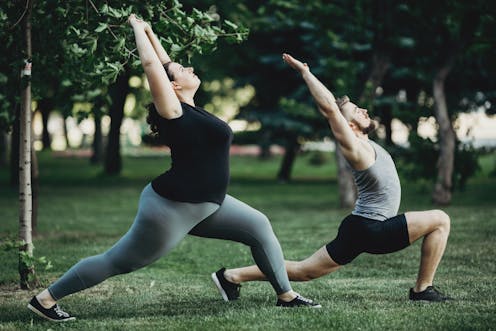Can you be overweight and healthy?
- Written by Nick Fuller, Charles Perkins Centre Research Program Leader, University of Sydney

One of the most contentious questions asked in the health community today is whether you can be overweight and healthy.
This question – sometimes framed using the term “fat but fit” – has preoccupied medical researchers for decades, fuelling numerous studies both supporting and debunking the concept.
The debate revolves around whether a physically active overweight or obese person can still be considered metabolically healthy – that is, they have good blood pressure, cholesterol and insulin levels.
As a health professional and obesity expert, my response to this question often surprises: I believe a person can indeed be overweight and healthy. Here’s why.
1. Weight and health are not perfectly correlated
As I discussed in my article on the Body Mass Index[1] (BMI), a person’s weight doesn’t always tell the full story of their health.
Read more: Using BMI to measure your health is nonsense. Here's why[2]
While being overweight increases an individual’s risk of a range of health issues[3], including heart disease, stroke, diabetes and some cancers, many studies[4] have shown a person’s disease risk is linked not to weight, but to body fat and where it’s distributed in the body.
While BMI calculators provide a starting point for assessing body fat, the BMI is not an accurate measure of health because it doesn’t explain where fat is distributed in the body.
People with a high amount of visceral fat – a type of especially unhealthy fat stored around the stomach, close to the organs – have a higher risk of disease[5] than people who hold body fat around their hips.
It’s also important to remember muscle is much denser than fat – another thing the BMI can’t measure.
Therefore, if a BMI calculator classifies you as overweight or obese, but you’re physically fit, have a healthy diet and lifestyle, and fat stored around your hips, you could be healthier than someone with a BMI in the “normal” range if they don’t exercise or eat a balanced diet.
2. Weight and fitness are not perfectly related either
We’ve been conditioned to believe being overweight is directly associated with being unfit. But it’s inactivity, not our weight, that directly impacts our fitness levels.
Indeed, numerous studies[6] have used exercise testing to show that some overweight and obese people have high cardiovascular fitness and strength levels. The difference? These people engaged in regular physical activity.
Regular exercise[7] will improve your fitness, no matter what you weigh. Sadly, more than half[8] of the Australian population don’t even do the 30 minutes of exercise needed five days a week to stay healthy and alive, let alone help them manage their weight.
Read more: Just because you're thin, doesn't mean you're healthy[9]
3. Lifestyle is more important than a number on the scales
It may sound obvious, but healthy behaviours – not weight – make us healthy.
While understanding and managing the relationship between our weight and health is important, we need to remember other factors influence good health too. Top among these are getting enough exercise, eating a healthy and balanced diet, reducing stress, and improving our sleep quality.
How to be healthy at any weight
You can do several simple things right now to support your overall health, no matter what you weigh.
Mix up your exercise routine
It’s indisputable that exercise has enormous health benefits. Alongside improving your heart health[10], regular activity improves muscle strength and mobility, reduces stress levels and promotes better sleep and energy levels.
To encourage more exercise, take up something you enjoy, no matter what it is. But make sure to include variety, as doing the same routine every day is a surefire way to get bored and avoid activity, and can also make it hard to hit your goals.
Read more: Viewpoints: can you be healthy at any weight?[11]
It’s also important to look for ways to incorporate incidental activity in your daily routine. Our sedentary lifestyles are literally killing us, with experts suggesting a week of physical inactivity has the equivalent personal health cost of smoking 20 cigarettes[12].
Introducing more activity can be as simple as taking the stairs instead of the lift, parking the car a little bit further away from our destination, or switching off the robot vacuum cleaner and taking on the housework ourselves.
Improve your sleep
Getting the recommended seven to nine hours of shuteye we need each night will significantly benefit your health. The good news is it’s easy to dramatically improve your sleep quality by taking simple steps to support good sleep hygiene. Start with the “no blue light after twilight” rule, switching off your devices early to boost your body’s secretion of sleep-inducing hormones such as melatonin.
Retrain your brain to manage your stress
Stress will adversely impact your health, often encouraging unhealthy dietary habits and contributing to chronic conditions such as high blood pressure.
Contrary to popular belief, alcohol[13] isn’t a good way to deal with stress! Instead, take up more beneficial activities to relieve stress, such as exercise and meditation.
The bottom line
Your weight does matter when it comes to your overall levels of health. It’s just not the only thing that matters, and it’s not always necessary to achieve the definition of a “healthy weight” category.
We should all be engaging in healthier lifestyle habits – whatever our weight.
References
- ^ Body Mass Index (theconversation.com)
- ^ Using BMI to measure your health is nonsense. Here's why (theconversation.com)
- ^ health issues (jamanetwork.com)
- ^ studies (academic.oup.com)
- ^ higher risk of disease (onlinelibrary.wiley.com)
- ^ numerous studies (academic.oup.com)
- ^ Regular exercise (ijbnpa.biomedcentral.com)
- ^ more than half (www.health.gov.au)
- ^ Just because you're thin, doesn't mean you're healthy (theconversation.com)
- ^ heart health (www.ncbi.nlm.nih.gov)
- ^ Viewpoints: can you be healthy at any weight? (theconversation.com)
- ^ smoking 20 cigarettes (bjsm.bmj.com)
- ^ alcohol (link.springer.com)
Read more https://theconversation.com/can-you-be-overweight-and-healthy-182219

















